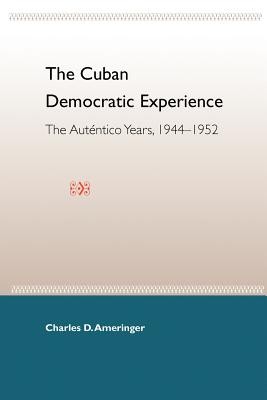
- We will send in 10–14 business days.
- Author: Charles D Ameringer
- Publisher: University Press of Florida
- Year: 2000
- ISBN-10: 0813026679
- ISBN-13: 9780813026671
- Format: 15.2 x 22.9 x 1.4 cm, softcover
- Language: English
- SAVE -10% with code: EXTRA
Reviews
Description
"A serious attempt to explore the strengths and weaknesses of Cuba's Autentico regime and its programs and failings in service of democracy. We can now see its legacy in the Batista and Castro eras."--Harold Dana Sims, University of Pittsburgh
Charles Ameringer looks at eight unique years in Cuban history--1944 to 1952--that generally have been ignored by most commentators, and examines the cultural, economic, political, and social features of the era.
Specialists divide the history of Cuba into three periods: the Plattist Republic (1902-1933); the Batista era (1933-1958); and the Cuban Revolution and Castro era (1959 to the present). Ameringer points out that this division glosses over the years when Cubans had a functioning democracy and, he contends, enjoyed a rare freedom of expression and an artistic flowering.
These years comprised the administrations of Ramon Grau San Martin and Carlos Prio Socarras, both freely elected leaders of the Cuban Revolutionary Party-Autentico (PRC-A). They avowed their dedication to fulfill the goals of the Revolution of 1933 (economic liberation and social justice) but failed to live up to those expectations, and their governments ultimately were marked by corruption and violence.
Without attempting to rehabilitate the Autenticos entirely, Ameringer probes the Cuban consciousness in order to understand the strengths and weaknesses of Cuban democracy during this special period. He concludes that the Autenticos eventually lost the respect of the people, and, despite significant reforms, their administrations led to the return to power of the opportunistic Fulgencio Batista.
Although written in a readable style, this book offers serious, solid analyses of key developments that fill major gaps in the current understanding of the circles of power in prerevolutionary Cuba.
Charles D. Ameringer, professor emeritus of Latin American history, Pennsylvania State University, is the author of The Caribbean Legion: Patriots, Politicians, Soldiers of Fortune, 1946-1950 and The Democratic Left in Exile: The Antidictatorial Struggle in the Caribbean, 1945-1959.
"EXTRA 10 % discount with code: EXTRA
The promotion ends in 20d.03:11:53
The discount code is valid when purchasing from 10 €. Discounts do not stack.
- Author: Charles D Ameringer
- Publisher: University Press of Florida
- Year: 2000
- ISBN-10: 0813026679
- ISBN-13: 9780813026671
- Format: 15.2 x 22.9 x 1.4 cm, softcover
- Language: English English
"A serious attempt to explore the strengths and weaknesses of Cuba's Autentico regime and its programs and failings in service of democracy. We can now see its legacy in the Batista and Castro eras."--Harold Dana Sims, University of Pittsburgh
Charles Ameringer looks at eight unique years in Cuban history--1944 to 1952--that generally have been ignored by most commentators, and examines the cultural, economic, political, and social features of the era.
Specialists divide the history of Cuba into three periods: the Plattist Republic (1902-1933); the Batista era (1933-1958); and the Cuban Revolution and Castro era (1959 to the present). Ameringer points out that this division glosses over the years when Cubans had a functioning democracy and, he contends, enjoyed a rare freedom of expression and an artistic flowering.
These years comprised the administrations of Ramon Grau San Martin and Carlos Prio Socarras, both freely elected leaders of the Cuban Revolutionary Party-Autentico (PRC-A). They avowed their dedication to fulfill the goals of the Revolution of 1933 (economic liberation and social justice) but failed to live up to those expectations, and their governments ultimately were marked by corruption and violence.
Without attempting to rehabilitate the Autenticos entirely, Ameringer probes the Cuban consciousness in order to understand the strengths and weaknesses of Cuban democracy during this special period. He concludes that the Autenticos eventually lost the respect of the people, and, despite significant reforms, their administrations led to the return to power of the opportunistic Fulgencio Batista.
Although written in a readable style, this book offers serious, solid analyses of key developments that fill major gaps in the current understanding of the circles of power in prerevolutionary Cuba.
Charles D. Ameringer, professor emeritus of Latin American history, Pennsylvania State University, is the author of The Caribbean Legion: Patriots, Politicians, Soldiers of Fortune, 1946-1950 and The Democratic Left in Exile: The Antidictatorial Struggle in the Caribbean, 1945-1959.
"

Reviews